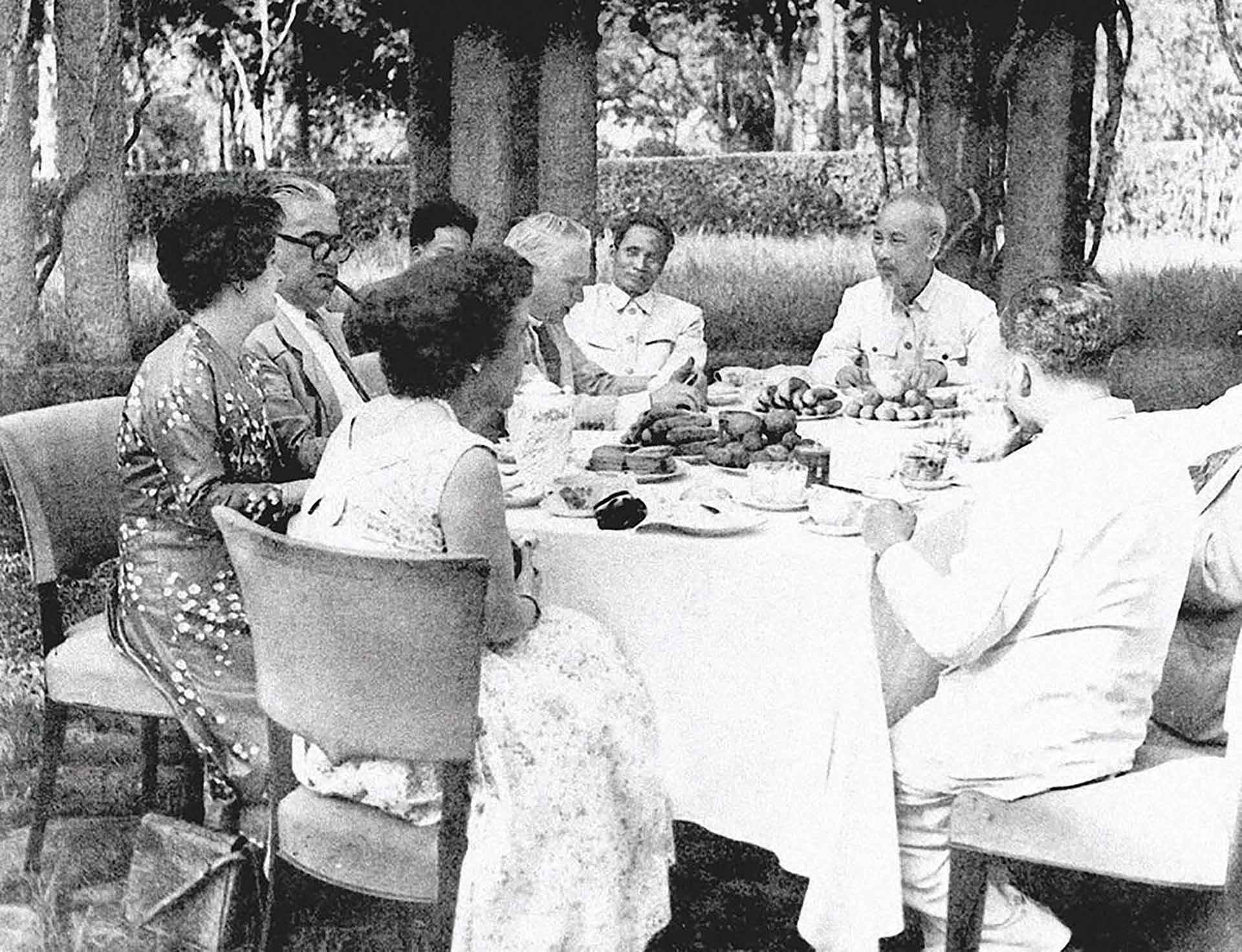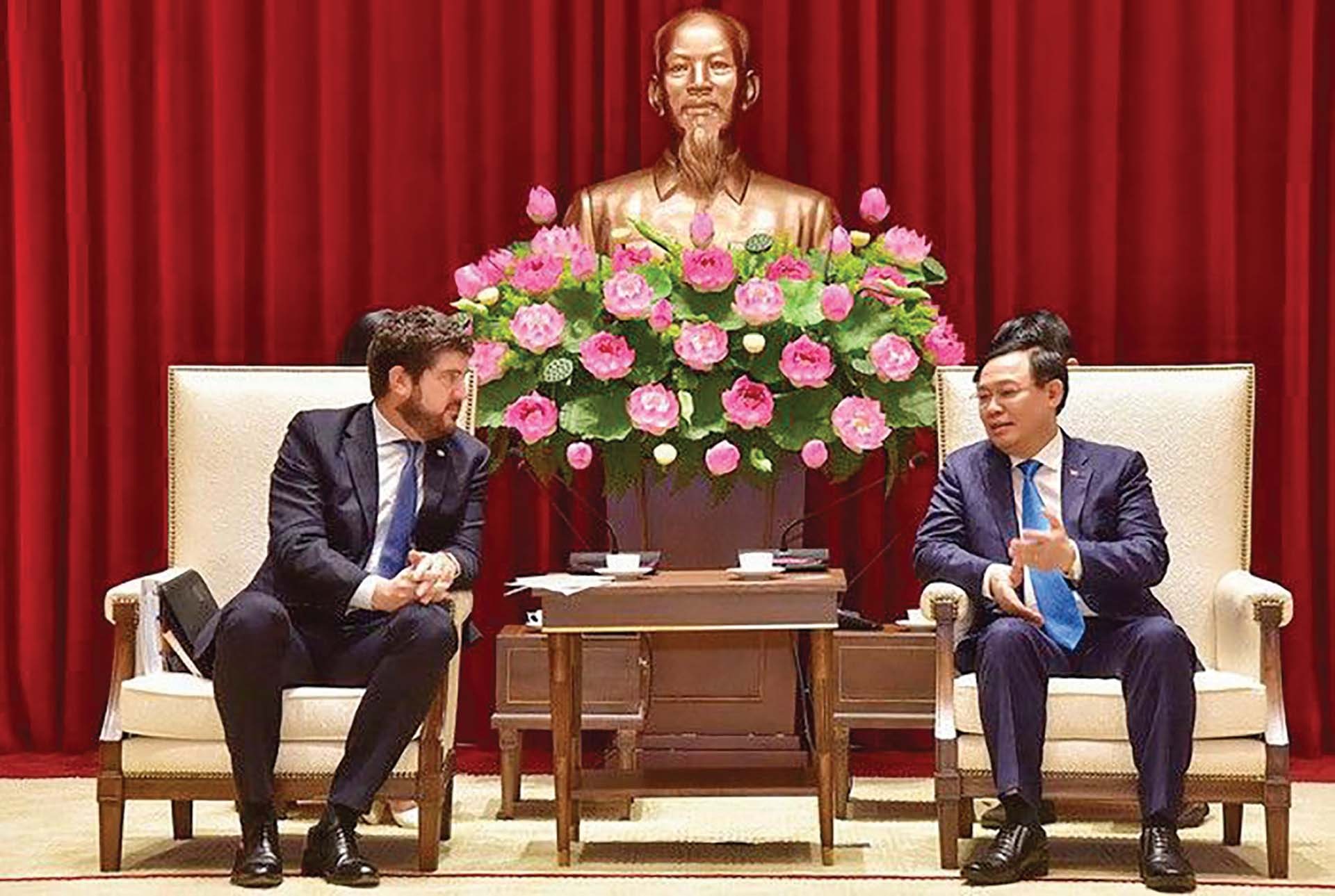
Continuing President Ho Chi Minh’s legacy within Vietnamese foreign policy
Latest
 |
| President Ho Chi Minh received a delegation of the UK Parliament members visiting Viet Nam on May 4, 1957. (Photo: Archive) |
I would do so taking a different tact than listing the numerous achievements of the country over the last decade which relate to soft power. I need only to look at the expanding collaboration in recent years between Viet Nam and UNESCO, as well as the country’s robust engagement within its various organs and bodies, to understand that cultural diplomacy continues to be wielded effectively as a tool of foreign policy.
The widening network of UNESCO World Biosphere reserves and Global Geoparks, coupled with a strong network of recognized World Heritage and Intangible Heritage and complemented recently by the country’s first Creative City (Ha Noi, 2019) and Learning Cities (Vinh City and Sa Dec, 2020), are testament to the country’s approach to place culture at the heart of development (1). With such a strong orientation, it is hardly surprising that cultural diplomacy would likewise play an important role within Vietnamese foreign policy.
However, to properly understand and evaluate the state’s National Strategy on Cultural Diplomacy, it is important to first situate it as part of a wider legacy of cultural diplomacy in Viet Nam, including the important contributions of President Ho Chi Minh to its success. To do so is for more than just historical interest, for it continues to have direct relevance for Viet Nam’s place in the international community - and for the country’s foreign affairs moving forward.
Further, and just as importantly, cultural diplomacy is not immune from the Fourth Industrial Revolution; on the contrary, it is transformed by it. Thus, an examination of the legacy of President Ho Chi Minh in this area is crucial, for when we seek to assess current strategy, we must first re-acquaint ourselves with the work of the masters.
Traveling oceans and continents, from East to West, President Ho Chi Minh gained during his formative years a unique perspective of the importance of intercultural dialogue as the foundation for mutual understanding and as an important communication tool. A global citizen long before the concept was termed, his extensive journeys abroad would have left him with a deep understanding of what motivated and attracted individuals to a cause – and where common ground was to be found between different peoples who lived on different sides of the planet. Above all else, President Ho Chi Minh was a humanist, and with his profound understanding of human nature came clarity on historical truth.
I have always felt this understanding was what allowed President Ho Chi Minh the confidence to incorporate the considerations and requirements of a future peace for Viet Nam into his decision-making, even as he was preparing for the long struggle of national liberation. If we put aside the uncommon talent required to remain consistent to such an approach in the face of so many difficult moments, we know from the record that his confidence to do so came from his understanding the essential truth at the heart of the struggle – namely the Vietnamese belief that they were one nation (and for whom the exercise of self-determination was therefore both a logical outcome as well as a right). And if a shared culture was at the foundation of that unity, which his quick action immediately after independence would suggest (here I refer to Decree 65 on 23 November 1945, a decree which called for the immediate protection of cultural and historic relics), it would then make sense to anchor diplomatic efforts within that same construct.
This was done to great success as Viet Nam’s modern history has demonstrated. The wisdom of such an approach is that it is effective beyond a states’ official relations with friendly countries, or for that matter, unfriendly countries. Culture is a human construct after all, and while intercultural dialogues are sometimes framed as being between states, in essence, it is a dialogue between the citizens of those two states. President Ho Chi Minh’s application of cultural diplomacy, which placed the Vietnamese people and culture at its core, was able to effectively connect beyond states to individuals who supported justice and freedom, many of whom were to be found outside the country’s traditional alliances, even successfully connecting with citizens of the very countries Viet Nam struggled against.
 |
| Secretary of Ha Noi City Party Vuong Dinh Hue received Chief Representative of UNESCO in Viet Nam Michael Croft, on September 9, 2020. (Source: CPV) |
Today, the international system is in a period of flux, and those who navigate the country’s direction in the international area do so in a context defined by complexity and instability. The path they tread is also somewhat more complicated than was previously, for classic theorists of foreign policy never had to contend with today’s reality that countries’ images are increasingly shaped by global perceptions formed online – to a great extent, we are no longer what we say we are – we are what others say we are. So what does this new reality mean for Viet Nam’s foreign affairs in the 21st century, and what actions must the country take to ensure that it is able to help shape of the global narrative on – and about – Viet Nam?
It is neither my purpose or ability to answer such profound questions here. However, it is sure that the answers to those questions will increasingly depend on the country’s cultural soft power. And because of this, cultural diplomacy will only grow in importance as a tool for Viet Nam’s foreign policy-makers.
Fortunately in terms of strategy, the historic number of votes received for its recent Security Council term and Viet Nam’s so-called COVID-diplomacy since 2020 suggest this is understood by the current generation of policy-makers in Ha Noi.
At a time when the nation increasingly looks outward to engage with the regional and the wider international community to secure its economic and diplomatic objectives, and when leaders approved the next articulation of its National Strategy for Cultural Diplomacy, it would appear proper attention is being given to President Ho Chi Minh’s legacy, not simply from a perspective of historical interest, but to ensure that the methods selected in the future reflect the lessons and foresight his approach has demonstrated.
For as he so well understood, knowing how the country can generate and maintain soft power is not a peripheral issue, but one central to the nation’s sovereignty and independence, and a critical element to be considered when positioning Viet Nam for success, stability and peace in the years to come.
1. A telling statistic is that nearly 17% of the land mass of the country, nearly 50,000 (sq) km, is now linked to a specific UNESCO designation.












